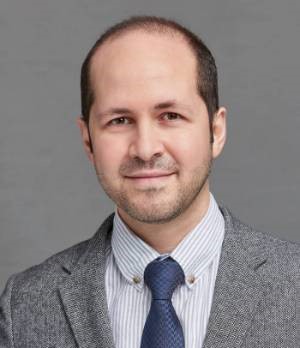Division of Research & Innovation
Faculty Honored with NSF CAREER Awards
Nascimento and Jazaei, recognized by the National Science Foundation with prestigious award
Faculty Early Career Development (CAREER) Program awards from the National Science Foundation are highly sought after and highly competive. From approximately 2,500 research proposals submitted each year by early-career faculty, approximately 20% are selected for the honor, what NSF describes as its “most prestigious awards in support of early-career faculty who have the potential to serve as academic role models in research and education and to lead advances in the mission of their department or organization."
To be eligible for this award, faculty must hold a doctoral degree in a field supported
by NSF; be engaged in research in an area of science, engineering or education supported by
NSF; and hold at least a 50% tenure-track (or tenure-track-equivalent) position as
an assistant professor. This year, the University of Memphis had two faculty members receive this prestigious
award.

Dr. Daniel Nascimento, assistant professor in Chemistry
“CAREER: Enabling the accurate simulation of multi-dimensional core-level spectroscopies in molecular complexes using time-dependent density functional theory.”
Over the past two decades, there have been tremendous advances in light source technologies that enabled the production of unprecedented ultrafast and high-intensity x-ray laser beams. These beams can be used to probe chemical processes that happen in the femtosecond time scale with extraordinary resolution, allowing us to gather time-resolved information about the electronic structure of atoms and molecules. This information is crucial to guide the development of novel technologies and to understand the intricate chemistry driving natural processes.
Nonetheless, to interpret and understand the wealth of data produced by large-scale x-ray facilities, one needs accurate and reliable theoretical models able to reproduce the relevant processes. Current models employed in the interpretation of experimental molecular x-ray data are either too simplified, such that a detailed (quantitative) picture cannot be obtained or demand large computations that are only feasible for relatively small molecules, due to the complicated quantum mechanical equations that encode the electronic structure of the system. These equations cannot, in general, be solved exactly and require the development of intelligent approximations and efficient computational algorithms.
As part of his CAREER project, Nascimento will build the computational infrastructure (methodologies, algorithms and software) specialized in the simulation of multi-dimensional spectroscopies in the x-ray regime from first principles. These simulations will enable a better understanding of molecular systems that are relevant for the development of novel materials and technologies and will have great potential to impact areas such as medicine (biosensing, photodynamic therapy, DNA photodamage), materials science and engineering (photocatalysis, photosensitizers), and environmental chemistry (atmospheric photochemistry).
The project also has an educational component that will impact the recruitment and formation of future theoretical and computational chemists through a summer program targeting undergraduate students from across the Mid-South region. The summer program will address several deficiencies in the training process that will facilitate student initiation and retention in the field and will serve as a vehicle to increase the participation of underrepresented groups in the theoretical and computational chemistry community.
For more on this project, contact Nascimento at drnscmnt@memphis.edu.
Dr. Farhad Jazaei, assistant professor in Civil Engineering
"CAREER: Determining the mechanism and significance of microplastic pollution impacts on soil hydrology.”
Plastic pollution, particularly microplastic contamination, is alarming as an emerging global environmental issue due to its pervasive nature and potential long-term impacts. Microplastics are typically defined as plastic particles that are less than 5 millimeters (mm) to 1 micrometer in size. Microplastics are small enough to infiltrate various ecosystems, from oceans to terrestrial (soil) environments. Since plastics are generally undegradable, they can accumulate in the environment, posing risks to the natural ecosystem dynamics. witnessing an exponentially growing rate of indecomposable plastic waste generation and anticipating no dramatic shifts in plastic production in the distant future, it can be concluded that microplastic will continue to accumulate in the environment, specifically topsoil layers, for many years to come. This underscores the urgent need for research, mitigation efforts, and policies to address this emerging contamination and its potential ramifications for environmental and human well-being.
Despite its importance, soil- microplastic pollution has received relatively little attention compared to aquatic (e.g., rivers and oceans) microplastic pollution. This NSF-CAREER award will support Jazaei and his team in bridging the critical knowledge gap in soil-microplastic pollution areas, specifically on agricultural farms. Agricultural farms are the most highly microplastic-polluted areas worldwide. According to the 2012 USDA study, about 52% of U.S. land cover is used for crop/non-crop agricultural purposes, of which many are expected to be contaminated by microplastic through the application of wastewater biosolids as fertilizer, plastic mulching, and using MP-polluted water. Dr. Jazaei’s laboratory will investigate the potential consequences of microplastic pollution on soil-water-plant dynamics. The findings of his laboratory will enable policymakers, scientists, and stakeholders to take proactive measures to mitigate or prevent negative outcomes of microplastic pollution. Moreover, findings will also help better comprehend the mechanisms of microplastic impacts; scientists can strive to develop effective mitigating strategies and approaches.
The next generation demands a higher level of expertise and knowledge in the field of soil-microplastic pollution to effectively address the environmental challenges they will face. Jazaei recognizes the critical importance of cultivating skilled professionals in this area and is dedicated to achieving this essential objective. By fostering a deeper understanding of microplastic pollution through education and training initiatives, Jazaei aims to empower future generations with the necessary expertise and tools to combat this pervasive environmental issue. Through his efforts, he seeks to inspire and equip the next wave of environmental stewards and experts who will play a pivotal role in safeguarding our planet's ecosystems and biodiversity for years to come.
For more information on this project, contact Jazaei at fjazaei@memphis.edu.

